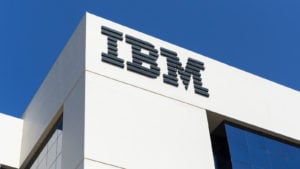As a tech reporter, I have a Mount Rushmore of the last decade’s biggest losers. These are leaders whose arrogance cost shareholders trillions in lost opportunity. One of them has to be Virginia Rometty of IBM (NYSE:IBM). By focusing on dividends and buybacks for IBM stock, Rometty missed the cloud.

She transformed IBM, which celebrated its 100th birthday in 2015, from an unquestioned technology leader into a laggard.
Facebook (NASDAQ:FB), founded in 2004, is now worth over six times more.
Rometty finally gave up the CEO chair in April to Arvind Krishna, who was running its cloud operations. He named Jim Whitehurst from Red Hat, the cloud software outfit acquired in 2019, as the company’s president.
Keep the Dividend?
Since Krishna took over, IBM stock has barely budged, up 1.6%. IBM is worth $109 billion, despite a dividend that now yields more than 6%.
Despite the cloud experience of its new leaders, IBM remains a hardware company. Rometty sought to obscure this point, but the company’s Z Series mainframes remain a major profit center. After delivering new versions in the second quarter, Z Series sales jumped 69%, year over year, to $1.9 billion, and profits rose 4.3%.
But that profit center has been milked dry. Getting rid of older workers just drained its talent pool, and put the government’s eyes on it. Earnings of $2.83 per share were down 38% from a year earlier, and revenues were down 4%. The dividend should be safe. It costs $1.45 billion each quarter to pay. Operating cash flow for the quarter was $3.58 billion.
Cloud, however, is a cash-intensive business. I have often written that the ante for the game comes to $1 billion per quarter. Today’s top cloud companies, including Facebook, spend $3 billion to $4 billion and more maintaining their clouds.
IBM no longer has it because it also has $59 billion in long-term debt. Most of that was used to acquire Red Hat, which cost $34 billion in 2019. Expanding its cloud footprint beyond the U.S. and Europe would be desirable, but would also end the dividend and cut the market cap.
Sell IBM?
Oracle (NASDAQ:ORCL), which also missed the cloud, is trying to generate cash flow for the game by buying part of TikTok. Dell Technologies (NASDAQ:DELL), another hardware-oriented firm, has looked to spin-off its VMware (NASDAQ:VMW) software unit, which competes with Red Hat. IBM has also linked closely with AT&T (NYSE:T), which also missed the cloud.
It would take tricky financial engineering for IBM to find the cash flow needed to compete. It could sell the hardware units to private equity, spin-off Red Hat, or spin its cloud operations into a REIT, as companies like Equinix (NASDAQ:EQIX) have done.
For now, IBM says it’s focusing on “hybrid cloud.” Here, enterprises retain their own data centers built to cloud standards then arbitrage larger public clouds like those of Amazon (NASDAQ:AMZN), Alphabet (NASDAQ:GOOG,NASDAQ:GOOGL) and Microsoft (NASDAQ:MSFT). IBM is aiming its sales effort at regulated industries and national governments with country-specific cloud laws. It’s also pushing its quantum computing efforts in the media, although they won’t contribute to profit for years.
The Bottom Line
IBM can still write a hopeful press release and it can talk a good game.
But can it save itself?
I bought some IBM stock this year, then sold it back at a small profit. I don’t see how IBM can compete in the big money game it’s involved in. It may be too late for it to survive as a separate company.
Many of my neighbors growing up on Long Island were IBMers. It represented a great career when computing and business were separate spheres. But those days are over.
To survive, IBM needs to think outside the box it’s placed itself in.
Maybe it should sell to Facebook.
At the time of publication, Dana Blankenhorn held long positions in AMZN and MSFT.
Dana Blankenhorn has been a financial and technology journalist since 1978. His latest book is Technology’s Big Bang: Yesterday, Today and Tomorrow with Moore’s Law, essays on technology available at the Amazon Kindle store. Write him at [email protected] or follow him on Twitter at @danablankenhorn.
